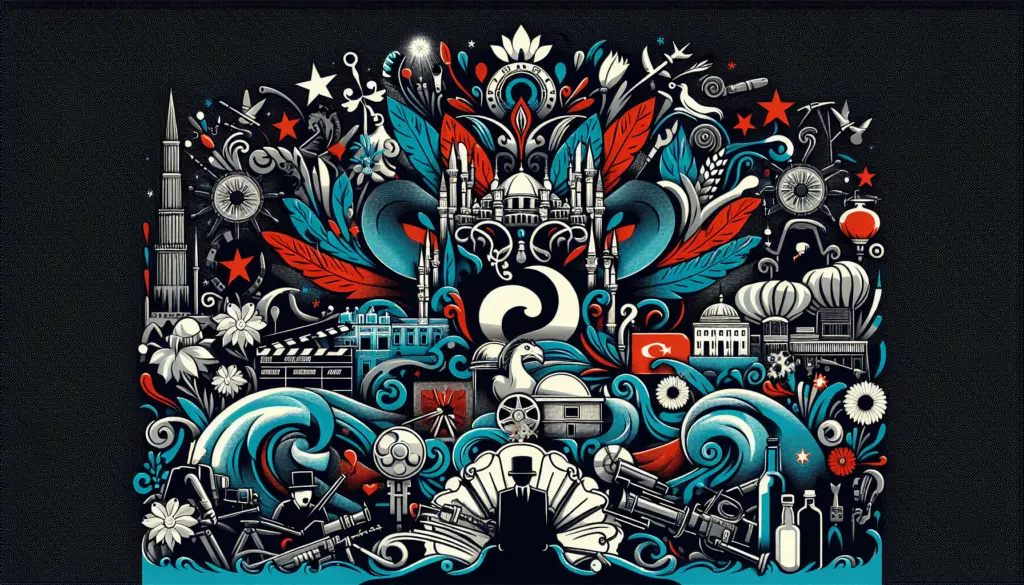Have you been keeping up with the vibrant and captivating world of Turkish cinema? If not, it’s time to dive into a revival that has left audiences all over the world in awe. The Renaissance of Turkish Cinema has brought forth a plethora of must-watch films and talented directors, redefining the industry and leaving a lasting impact on the global stage. From gripping dramas to thought-provoking documentaries, these cinematic gems offer a unique perspective on Turkish culture and society. Whether you’re a film enthusiast or simply looking to broaden your horizons, these films and directors are sure to captivate your imagination and leave you craving for more. So grab your popcorn and get ready for a cinematic journey like no other.
Classic Turkish Films
Yol (1982)
Yol, directed by Yılmaz Güney, is considered a masterpiece of Turkish cinema. The film explores the lives of five prisoners who are granted a week of freedom but face challenges and hardships on their journey back home. It delves into the issues of freedom, social inequality, and human struggles. Yol won the Palme d’Or at the 1982 Cannes Film Festival and received international acclaim for its powerful storytelling and striking cinematography.
Cüzdan (1955)
Cüzdan, directed by Eşref Dinçer, is a classic Turkish comedy that follows the misadventures of a pickpocket who accidentally steals a wallet containing a valuable diamond. Full of slapstick humor and witty dialogue, Cüzdan has become a beloved film in Turkish cinema history. It showcases the talent of Turkish actors in delivering comedic performances and offers a lighthearted escape for viewers.
Aaah Belinda (1957)
Directed by Atıf Yılmaz, Aaah Belinda is a romantic drama film that tells the story of a young woman torn between her love for two different men. It explores themes of love, desire, and societal expectations in a conservative Turkish context. Aaah Belinda became a critical and commercial success at the time of its release, and it remains a significant piece of Turkish cinema that highlights the emotional complexities of relationships.
Selvi Boylum Al Yazmalım (1977)
Selvi Boylum Al Yazmalım, directed by Atıf Yılmaz, is a classic Turkish romance film that has become an iconic symbol of love and devotion. The story revolves around an unlikely relationship between two individuals from different social backgrounds. With its beautiful cinematography and heartfelt performances, the film captures the essence of Turkish culture and the power of love. Selvi Boylum Al Yazmalım is recognized as a timeless masterpiece that continues to resonate with audiences.
Contemporary Turkish Films
Winter Sleep (2014)
Winter Sleep, directed by Nuri Bilge Ceylan, is a contemplative drama that revolves around the life of a retired actor who owns a hotel in a remote Turkish village. The film delves into the depths of human relationships, morality, and the complexities of human nature. Winter Sleep won the prestigious Palme d’Or at the 2014 Cannes Film Festival, solidifying Ceylan’s reputation as one of the most acclaimed Turkish directors of his generation.
Once Upon a Time in Anatolia (2011)
Directed by Nuri Bilge Ceylan, Once Upon a Time in Anatolia is a captivating and atmospheric crime drama. It follows a group of people, including police officers, a prosecutor, and suspects, as they search for a corpse in the vast Anatolian steppes. The film explores themes of guilt, existentialism, and the blurred lines between truth and perception. Once Upon a Time in Anatolia received critical acclaim for its meticulous storytelling and stunning visuals.
Mustang (2015)
Mustang, directed by Deniz Gamze Ergüven, is a coming-of-age drama that centers around five teenage sisters living in a rural Turkish village. The film portrays their struggle against traditional gender roles and their desire for independence. Mustang received widespread critical acclaim and was selected as the Turkish entry for Best Foreign Language Film at the 88th Academy Awards. It serves as a powerful representation of the challenges faced by young women in Turkish society.
Three Monkeys (2008)
Directed by Nuri Bilge Ceylan, Three Monkeys is a psychological thriller that revolves around a family’s secrets and the consequences of their actions. The film explores themes of guilt, betrayal, and the complexities of human relationships. Three Monkeys was nominated for the Palme d’Or at the 2008 Cannes Film Festival and showcases Ceylan’s ability to create thought-provoking narratives that resonate with audiences.

Acclaimed Turkish Directors
Nuri Bilge Ceylan
Nuri Bilge Ceylan is widely regarded as one of the most prominent and influential directors in Turkish cinema. Known for his introspective and atmospheric storytelling, Ceylan’s films often explore themes of existentialism, human nature, and social dynamics. He has received numerous awards and accolades, including the Palme d’Or at the Cannes Film Festival for Winter Sleep. Ceylan’s films have had a significant impact on both Turkish and international cinema.
Fatih Akin
Fatih Akin is a German-born Turkish filmmaker known for his exploration of multicultural identities and the complexities of human relationships. His films often tackle controversial social issues and showcase the cultural diversity of contemporary Turkey. Akin’s works have received critical acclaim and have been recognized with prestigious awards, including the Golden Bear at the Berlin International Film Festival for his film Head-On. He has been instrumental in bringing Turkish cinema to a global audience.
Zeki Demirkubuz
Zeki Demirkubuz is a renowned director known for his introspective and dark dramas that explore the psychological depths of his characters. His films often delve into themes of isolation, morality, and personal redemption. Demirkubuz’s unique storytelling style and nuanced character development have earned him critical acclaim both in Turkey and internationally. His film Destiny was chosen as the Turkish entry for Best Foreign Language Film at the 73rd Academy Awards.
Semih Kaplanoglu
Semih Kaplanoglu is a director known for his visually stunning and poetic films that capture the beauty of nature and human existence. His works often focus on human relationships, personal journeys, and the exploration of memories. Kaplanoglu’s film Honey won the Golden Bear at the 60th Berlin International Film Festival, establishing him as a prominent figure in Turkish cinema. His films offer a unique blend of emotional depth and visual storytelling.
Rise of Turkish Cinema
International recognition
In recent years, Turkish cinema has gained significant international recognition, with Turkish films being screened and awarded at prestigious film festivals around the world. Filmmakers such as Nuri Bilge Ceylan, Fatih Akin, and Semih Kaplanoglu have brought Turkish cinema to the global stage, showcasing the talent and creativity of Turkish filmmakers.
Increased funding
The rise of Turkish cinema can also be attributed to increased funding and support from both the public and private sectors. The Turkish Ministry of Culture and Tourism has made concerted efforts to promote and finance the production of quality Turkish films, leading to the growth and development of the industry.
Diverse storytelling
Turkish cinema has embraced diverse storytelling, exploring a wide range of genres and themes. From thought-provoking dramas to comedies and thrillers, Turkish filmmakers have showcased a diverse array of narratives that appeal to both domestic and international audiences.
Tackling social issues
Turkish cinema has served as a platform for addressing and raising awareness about important social issues. Filmmakers have explored topics such as gender equality, LGBTQ+ rights, migration, and political criticism, providing a voice for marginalized communities and shedding light on societal challenges.

Oscar Success
Nuri Bilge Ceylan’s ‘Winter Sleep’ (2014)
Nuri Bilge Ceylan’s film Winter Sleep made history by becoming the first Turkish film to win the Palme d’Or at the Cannes Film Festival. The film was also selected as the Turkish entry for Best Foreign Language Film at the 87th Academy Awards. Although it did not win the Oscar, Winter Sleep’s recognition at such prestigious events brought global attention to Turkish cinema and established Ceylan as a prominent figure in the industry.
Deniz Gamze Ergüven’s ‘Mustang’ (2015)
Mustang, directed by Deniz Gamze Ergüven, received critical acclaim and was nominated for Best Foreign Language Film at the 88th Academy Awards. The film explores themes of female empowerment and challenges societal norms, resonating with audiences worldwide. Mustang’s nomination further solidified the impact of Turkish cinema on the global stage.
Films with Cultural Impact
Cross-cultural exploration
Turkish films have provided a unique opportunity for cross-cultural exploration, exposing international audiences to Turkish culture and traditions. Through their narratives and visual aesthetics, Turkish filmmakers have fostered a deeper understanding and appreciation of Turkish society and its historical context.
Preservation of Turkish traditions
Turkish cinema has played a vital role in preserving and promoting Turkish traditions and heritage. Many films showcase traditional music, clothing, and customs, keeping them alive for future generations. By capturing the essence of Turkish culture, these films contribute to a sense of national identity and pride.
Challenging stereotypes
Turkish cinema has actively challenged stereotypes and misconceptions about Turkish society. Filmmakers have portrayed nuanced and complex characters that defy simplistic categorization, offering a more authentic and diverse representation of Turkish culture. By showcasing the unique perspectives and experiences of individuals, Turkish cinema has broken down barriers and fostered empathy and understanding.
Promotion of Turkish tourism
The visual beauty and cultural richness showcased in Turkish films have had a positive impact on tourism in Turkey. Many films feature stunning landscapes and historical sites, enticing viewers to visit and explore the country. The promotion of Turkish tourism through cinema has contributed to the growth of the industry and the economic development of local communities.
Evolving Film Industry
Emerging talent
The Turkish film industry has seen the emergence of young and talented filmmakers who bring fresh perspectives and innovative storytelling techniques. These new voices have injected new life into Turkish cinema and have pushed the boundaries of cinematic creativity.
Technological advancements
Advancements in technology have played a crucial role in the growth and development of Turkish cinema. Filmmakers now have access to better equipment and post-production facilities, allowing them to create visually stunning and technically proficient films. This has enabled Turkish cinema to compete on a global scale and attract international recognition.
Film festivals and events
Turkey has become a hub for film festivals and events that celebrate and promote Turkish cinema. These festivals provide a platform for filmmakers to showcase their work, network with industry professionals, and gain exposure to both domestic and international audiences. Istanbul International Film Festival and Antalya Golden Orange Film Festival are among the most prominent events that contribute to the growth of the Turkish film industry.
International collaborations
The Turkish film industry has prioritized international collaborations, partnering with filmmakers, production companies, and distributors from around the world. These collaborations have allowed Turkish filmmakers to access global audiences and resources, expanding the reach and impact of Turkish cinema.
Representation and Social Issues
Gender equality
Turkish cinema has played a significant role in promoting gender equality and challenging gender norms. Filmmakers have explored diverse female characters who defy societal expectations and pursue their dreams. These films have sparked important conversations about women’s rights and have contributed to the larger discourse on gender equality in Turkish society.
LGBTQ+ rights
Turkish cinema has also contributed to the visibility and recognition of LGBTQ+ individuals and their struggles. Filmmakers have explored the challenges faced by the LGBTQ+ community in Turkey and have shed light on the importance of acceptance and inclusion. These films have served as a catalyst for social change and have helped challenge discriminatory attitudes.
Migration and refugees
Turkish filmmakers have tackled the pressing issue of migration and refugees, shedding light on the experiences and challenges faced by those who have been displaced. These films provide a platform for empathy and understanding, encouraging dialogue and creating awareness about the global refugee crisis.
Political criticism
Turkish cinema has been a powerful tool for political criticism and social commentary. Filmmakers have addressed political corruption, societal inequalities, and human rights abuses, often risking censorship and backlash. By confronting these issues head-on, Turkish cinema has served as a voice for the marginalized and has contributed to a more informed and engaged citizenry.
Exploration of Historical Context
Ottoman Empire era
Many Turkish films explore the rich historical legacy of the Ottoman Empire, bringing to life the opulence, intrigue, and conflicts of that era. These films provide a glimpse into the cultural heritage of Turkey and help to preserve the collective memory of the Ottoman Empire’s influence on Turkish society.
Kemalist reforms
The Kemalist reforms, initiated by Mustafa Kemal Atatürk in the early 20th century, have had a profound impact on Turkish society and identity. Turkish cinema has explored this transformative period, reflecting on the struggles, achievements, and challenges faced during the implementation of these reforms. These films contribute to a broader understanding of the historical context in which modern Turkey emerged.
Political unrest
Turkey has witnessed periods of political unrest and social upheaval throughout its history. Turkish cinema has captured these tumultuous times, exploring the impact of political movements, authoritarian rule, and the fight for democracy. These films serve as a reminder of the fragility of political systems and the importance of upholding democratic values.
Tensions with neighboring countries
The geopolitical tensions and conflicts between Turkey and its neighboring countries have also been explored in Turkish films. These films shed light on the complexities of regional dynamics, the impact of war and conflict, and the resilience of individuals in the face of adversity. By addressing these sensitive subjects, Turkish filmmakers contribute to a broader understanding of regional politics and foster dialogue for peace.
Turkish Cinema’s Global Influence
Film festivals abroad
Turkish films have been showcased and celebrated at prestigious film festivals worldwide, bringing Turkish cinema to a global audience. The inclusion of Turkish films in international festivals not only promotes cultural exchange but also highlights the artistic achievements of Turkish filmmakers.
International collaborations
Turkish filmmakers have actively sought collaborations with international artists, working on co-productions and sharing creative ideas. These collaborations have enriched Turkish cinema by incorporating diverse perspectives and storytelling styles. The blending of different cultural influences has been instrumental in expanding the global reach of Turkish films.
Recognition at prestigious award ceremonies
The success of Turkish films at prestigious award ceremonies, such as the Cannes Film Festival and the Academy Awards, has elevated Turkish cinema to a global platform. The recognition and accolades received by Turkish filmmakers have not only brought attention to their work but have also highlighted the quality and artistic prowess of the Turkish film industry.
Cultural exchange and appreciation
Turkish cinema has played a crucial role in fostering cultural exchange and promoting a deeper appreciation of Turkish culture and storytelling traditions. Through their films, Turkish directors have presented narratives and perspectives that resonate with audiences worldwide, fostering a sense of shared humanity and celebrating the richness of cultural diversity.
In conclusion, the Renaissance of Turkish cinema has been marked by the emergence of talented filmmakers, increased international recognition, and the exploration of diverse narratives and social issues. From classic films that have stood the test of time to contemporary masterpieces that have garnered critical acclaim, Turkish cinema has firmly established itself on the global stage. By challenging stereotypes, capturing the essence of Turkish culture, and conveying powerful messages, Turkish films have not only entertained but also enlightened audiences around the world. With an evolving film industry, a commitment to representation and social issues, and a growing global influence, Turkish cinema continues to captivate and inspire audiences, offering a unique perspective on the human experience.

